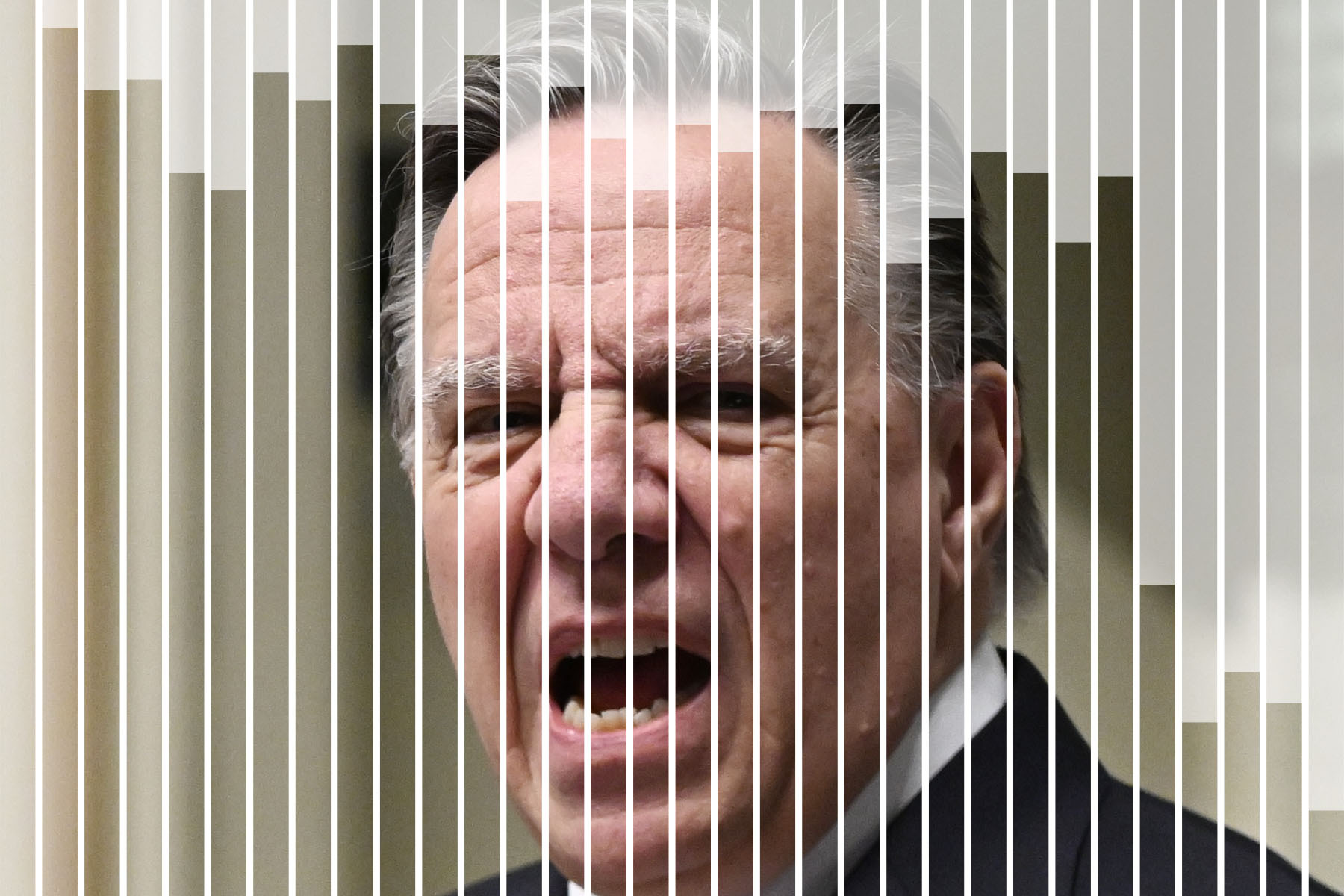In June, a Quebec poll from Pallas Data measured the favourability of four permanent provincial party leaders. The names tested in the questionnaire were Premier François Legault of the Coalition Avenir Québec, Paul St-Pierre Plamondon of the Parti Québécois, Gabriel Nadeau-Dubois of Québec solidaire, and Éric Duhaime of the Conservative Party of Quebec. (The Quebec Liberal Party was not included in these questions since Marc Tanguay is an interim leader.)
I suspected that the premier’s image had taken a hit in the past year, since Legault’s once mighty CAQ has been trailing in the polls since last fall. Nevertheless, support for his party has been stabilizing since the New Year: polling from Pallas and Léger shows the CAQ oscillating between 20 and 25 percent in popular support—each time trailing the Parti Québécois by margins ranging from seven to thirteen points.
But how do the premier’s personal numbers fare?
In the June Pallas poll, 23 percent of province-wide respondents said they held a favourable impression of Legault, against a stunning 60 percent who held an unfavourable impression—a net score of minus 37, a result far worse than those of his main rivals at the national assembly. (Net scores are favourable impressions minus unfavourable impressions.)
Like I mentioned, we knew Legault’s image had taken a hit, but these figures were far worse than I had imagined.
When the CAQ stumbled to second place last fall, many observers of Quebec politics had wondered whether the party could take on the surging PQ and regain lost ground over the winter and spring. It was not to be. One of the reasons why the CAQ slump endures could simply be that Legault himself has dramatically fallen out of favour with the Quebec electorate.
PQ leader Paul St-Pierre Plamondon is the only party leader with a net positive score. The poll found that 40 percent of respondents say they have a favourable impression of Plamondon, against 32 percent with an unfavourable impression—a net score of plus 8. This data suggests that the PQ may not even have reached its ceiling of support yet, despite voting intentions for the PQ having hit a plateau around the 32 percent to 34 percent range in recent months.
A leader outpolling his party is an indicator of potential growth. Plamondon has it; Legault doesn’t.
Next in line was QS’s co-spokesperson, Gabriel Nadeau-Dubois, of whom 29 percent of respondents have a favourable impression, meaning that Nadeau-Dubois, too, is doing better than his own party (16 percent of respondents support QS in a later survey). However, Nadeau-Dubois’s ceiling is decidedly lower than Plamondon’s, as 41 percent of respondents say they have an unfavourable impression of him—a net score of minus 12.
Perhaps the premier can take comfort in the favourability numbers of the seatless leader of the CPQ, Éric Duhaime. Across the province, 62 percent said they had an unfavourable impression of the former radio host (including 47 percent with a “very unfavourable” impression—the highest proportion among those for the leaders named in the survey), compared to just 13 percent with a favourable impression—for a ghastly net score of minus 49. Nevertheless, Duhaime has put several CAQ Quebec City ridings in his party’s crosshairs since taking over the once moribund CPQ. His party came up short in 2022 in terms of seats but still amassed over half a million votes, and current polls show his party remains stable in popular opinion.
The poll’s regional and demographic breakdowns offer little good news for Legault, as none of the sub-samples has the premier’s favourability above water. Legault’s unpopularity is truly widespread.
To wit: among men and women, in Greater Montreal, Quebec City, and other regions of Quebec, proportions of unfavourable impressions for Legault are near or above the 60 percent mark.
The only sub-sample where Legault is (slightly) less unfavourably perceived is among voters aged sixty-five and over, and even then, it’s not that rosy: 47 percent unfavourable, 33 percent favourable, 13 percent neutral (minus 14). Among voters aged eighteen to forty-nine (which is a lot of voters), Legault’s net favourability stands at a dismal minus 53.
However, the figure that could cause massive headaches for the CAQ: 56 percent among francophone voters hold an unfavourable impression of Legault, a net anemic score of minus 28 among the francophone majority. In Legault’s second straight majority victory in 2022, estimates from results and late-campaign polls had the CAQ winning close to 50 percent of the vote among francophones.
With such results for Legault, it is virtually impossible for the CAQ to regain lost ground before the next election. A few points here and there could perhaps flock back, but historically, Quebec voters do not have the habit of voting in a party whose leader they dislike.
The tide has dramatically turned from a time when polls showed Legault as one of the most beloved premiers in Quebec’s history, rivalling the numbers of Lucien Bouchard at his peak in the ’90s. Then along came Bernard Landry, Jean Charest, Pauline Marois, and Philippe Couillard, all of whom went through popular periods but never to the stratospheric levels Legault reached early in his first term and during the pandemic.
The annus horribilis that was 2023 for Legault and the CAQ has undoubtedly left a mark: the broken promise of the Quebec City–Lévis bridge/tunnel (only to have them change their minds again), a persistently strong nationalist rhetoric with little to show for it, a controversial multi-million-dollar subsidy for Los Angeles Kings pre-season games, one of the largest deficits in Quebec’s history after the government cut taxes and sent post-election payments to millions in order to “fight” inflation. The list is exhaustive.
These poor numbers for Legault are comparable to those for Justin Trudeau in federal polls over the past year . . . and that’s saying something. Naturally, Legault has time to recover before the scheduled October 2026 election, but didn’t we write the exact same lines about Trudeau and the federal Liberals last summer?
We sure did.





